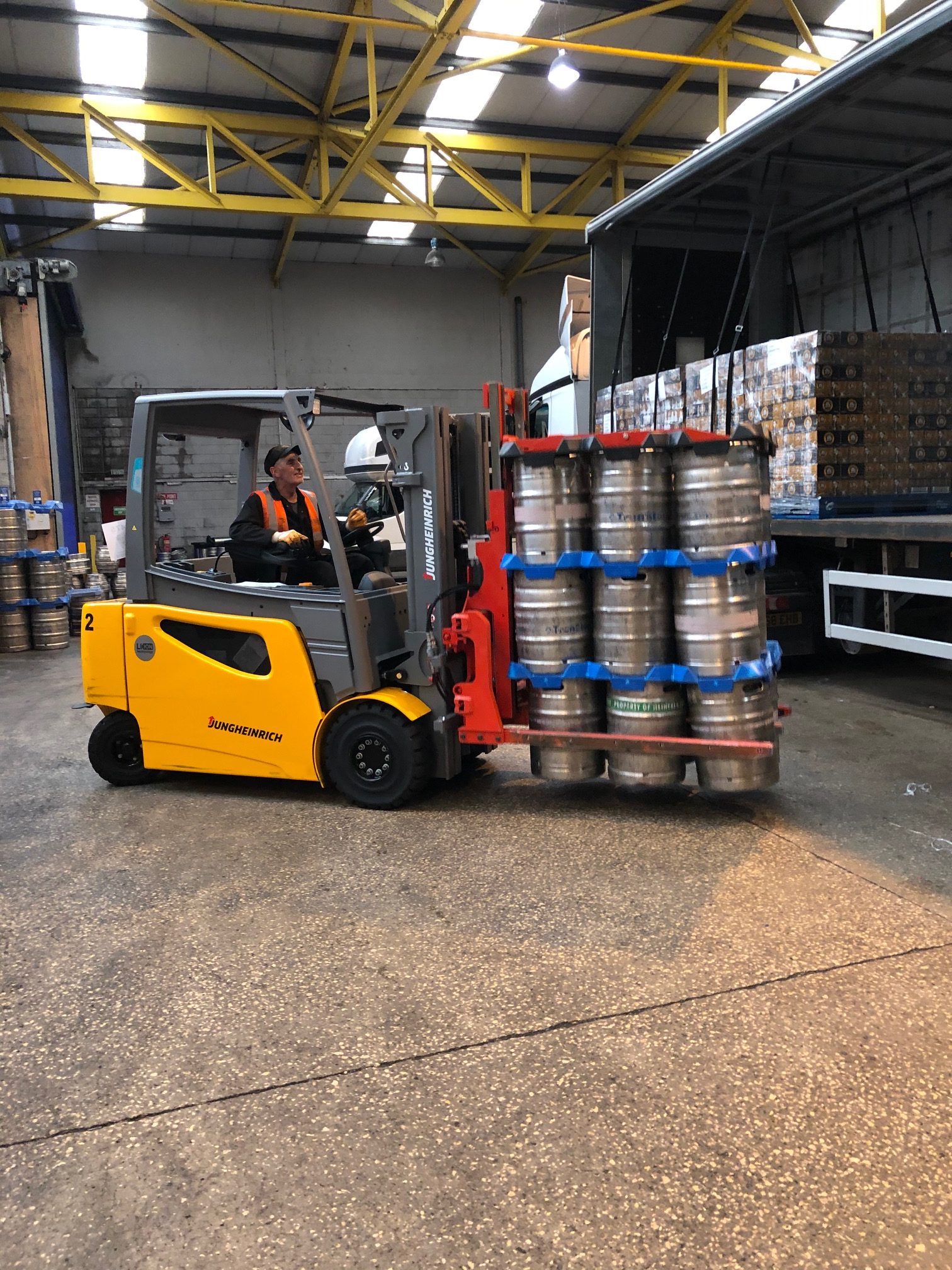Electric Forklift: The Essential Tool For Efficient Warehousing
The Electric Forklift: The Essential Tool For Efficient Warehousing.
Editor's Notes: "Electric Forklift: The Essential Tool For Efficient Warehousing" have published today date The efficient flow of inventory is crucial for maintaining operational efficiency in warehouses and distribution centers. This is why it's essential to equip your facility with the right equipment, and electric forklifts have proven to be an invaluable asset in this regard.
After doing some analysis, digging information, made Electric Forklift: The Essential Tool For Efficient Warehousing we put together this Electric Forklift: The Essential Tool For Efficient Warehousing guide to help target audience make the right decision.
Key differences or Key takeways, provide in informative table format
| Feature | Electric forklifts | Internal combustion forklifts |
|---|---|---|
| Emissions | Zero emissions | Produces emissions |
| Fuel | Electricity | Diesel, gasoline, or propane |
| Noise level | Quieter | Noisier |
| Maintenance | Less maintenance required | More maintenance required |
| Cost | Higher initial cost | Lower initial cost |
Transition to main article topics
FAQ
This comprehensive FAQ section aims to clarify any concerns or misconceptions regarding electric forklifts and their role in efficient warehousing. Dive into these frequently asked questions to gain a deeper understanding of the benefits, applications, and considerations involved in utilizing these essential tools.

Food Warehousing: Essential Tips for Safe & Efficient Storage - Source logistipedia.com
Question 1: What are the key advantages of electric forklifts over traditional internal combustion engine (ICE) forklifts?
Electric forklifts offer several notable advantages over ICE forklifts, including:
Question 2: What are the different types of electric forklifts available?
Electric forklifts come in various types, each suited to specific applications:
Question 3: What factors should be considered when choosing an electric forklift?
When selecting an electric forklift, it is crucial to consider factors such as:
Question 4: How can electric forklifts enhance the efficiency of warehousing operations?
Electric forklifts can significantly boost warehousing efficiency through:
Question 5: How does battery technology impact the performance of electric forklifts?
Battery technology plays a crucial role in determining the performance of electric forklifts:
Question 6: What safety measures should be implemented when operating electric forklifts?
Ensuring the safe operation of electric forklifts requires:
By addressing these frequently asked questions, we aim to provide a comprehensive understanding of electric forklifts and their transformative role in efficient warehousing. These versatile and sustainable tools offer numerous benefits that can streamline operations, enhance safety, and drive productivity to new heights.
To delve deeper into the world of electric forklifts, we invite you to explore the following article sections:
Tips
Incorporating electric forklifts into your warehousing operations offers numerous advantages. Here are some tips to maximize their efficiency:

Premium Photo | Blurred motion robotic forklift signifies AI's fast - Source www.freepik.com
Tip 1: Choose the Right Forklift for the Job
Consider the size, weight capacity, and specific requirements of your operation. Electric forklifts come in various models, each designed for specific tasks.
Tip 2: Implement Proper Maintenance
Regular maintenance is crucial for optimal performance and longevity. Follow manufacturer guidelines, including battery maintenance, fluid checks, and inspections.
Tip 3: Train Operators Thoroughly
Operators should receive comprehensive training to ensure safe operation, proper handling techniques, and emergency procedures.
Tip 4: Optimize Warehouse Layout
Design your warehouse layout to facilitate efficient forklift movement, minimizing travel time and optimizing productivity.
Tip 5: Optimize Battery Charging
Develop an efficient battery charging system to minimize downtime and maximize battery life. Consider charging stations and battery swapping protocols.
Tip 6: Use Advanced Technologies
Incorporate technologies like GPS tracking, remote monitoring, and automated guidance systems to enhance safety, efficiency, and productivity.
Tip 7: Promote Safety First
Establish clear safety protocols, including proper attire, designated safety zones, and regular inspections to minimize accidents and injuries.
Tip 8: Evaluate and Improve Continuously
Regularly assess the performance of your electric forklift fleet and identify areas for improvement to enhance efficiency and overall operations.
By following these tips, businesses can maximize the efficiency of their electric forklifts, optimizing warehousing operations and driving productivity. To learn more about the benefits and applications of electric forklifts, refer to the comprehensive article Electric Forklift: The Essential Tool For Efficient Warehousing.
Electric Forklift: The Essential Tool For Efficient Warehousing
Electric forklifts are a critical equipment in modern warehousing, facilitating efficient material handling and optimizing operations. They offer a range of benefits that enhance productivity, safety, and cost-effectiveness. Here are six essential aspects to consider:

Keg Clamp Attachments for UK Brewer Forklift Fleet - Source www.logisticsbusiness.com
- Zero Emissions: Electric forklifts produce no direct emissions, reducing environmental impact and improving air quality in warehouses.
- Low Maintenance: Electric forklifts require less maintenance compared to diesel or gas-powered models, resulting in lower downtime and maintenance costs.
- Energy Efficiency: Electric forklifts convert electrical energy into mechanical energy with high efficiency, minimizing energy consumption and reducing operating costs.
- Quiet Operation: Electric motors operate quietly, creating a less noisy work environment that improves communication and reduces operator fatigue.
- Increased Safety: Electric forklifts provide enhanced safety features, such as regenerative braking and anti-rollover systems, minimizing accidents and ensuring operator well-being.
- Maneuverability: Electric forklifts are compact and agile, allowing them to easily navigate narrow aisles and tight spaces, maximizing space utilization.
The benefits of electric forklifts extend beyond their environmental and economic advantages. They contribute to a more efficient warehousing operation by reducing downtime, improving productivity, and ensuring a safe and comfortable work environment. By incorporating electric forklifts into their fleets, warehouses can significantly enhance their material handling capabilities and optimize their overall efficiency.

Premium AI Image | Efficient Warehousing Forklift Loading Pallets and - Source www.freepik.com
Electric Forklift: The Essential Tool For Efficient Warehousing
Electric forklifts are indispensable in modern warehousing operations due to their efficiency and versatility. Their electric motors provide quiet, emission-free operation, reducing noise pollution and improving air quality within the warehouse. Moreover, their compact design allows them to navigate narrow aisles and tight spaces, maximizing storage capacity.

Close-up Yellow Hand Pallet Truck or Manual Forklift Pallet Jack. Work - Source www.dreamstime.com
The use of electric forklifts also enhances productivity. Their precise controls enable operators to handle loads accurately and quickly, reducing the risk of accidents and damage to goods. Additionally, the regenerative braking system recovers energy during deceleration, extending battery life and reducing operating costs.
Furthermore, electric forklifts contribute to environmental sustainability. Their zero emissions minimize the carbon footprint of warehousing operations, promoting a greener and more responsible supply chain. By replacing diesel-powered forklifts, electric models significantly reduce greenhouse gas emissions, contributing to a cleaner and healthier environment.
| Advantages |
|---|
| Efficient and quiet operation |
| Compact design for space optimization |
| Enhanced productivity |
| Reduced operating costs |
| Environmental sustainability |
Conclusion
Electric forklifts have become essential tools for efficient warehousing operations. Their environmental, economic, and operational benefits make them a preferred choice in the industry. By adopting electric forklifts, businesses can enhance their productivity, reduce their environmental impact, and optimize their warehousing processes.
The future of warehousing lies in automation and sustainability, and electric forklifts play a key role in this transformation. With advancements in technology, electric forklifts are expected to become even more efficient, reliable, and integrated into warehouse management systems. This will further contribute to the optimization of warehousing operations, enabling businesses to meet the demands of a dynamic and evolving supply chain.
Midtjylland And Fenerbahce Clash In Europa League Knockout Tie, Dara Huang: Renowned Expert In Artificial Intelligence And Machine Learning, NBL Rivalry Renewed: Wildcats Host Taipans In Perth Showdown, Understand ADHD Symptoms: A Comprehensive Guide For Diagnosis And Management, Australia's Beacon Of Inspiration: Unveiling The 2025 Australian Of The Year, Al Qadisiya Vs Al Hilal: Saudi Pro League Match Preview And Betting Odds, Gimnasia Vs. San Lorenzo: Crucial Argentine Primera Division Clash, Southampton Vs. Newcastle: Premier League Showdown, Premier League Clash: Manchester City Battles Chelsea For Dominance, Real Madrid Vs. Brest: Pre-Season Friendly Match Preview And Team Analysis,